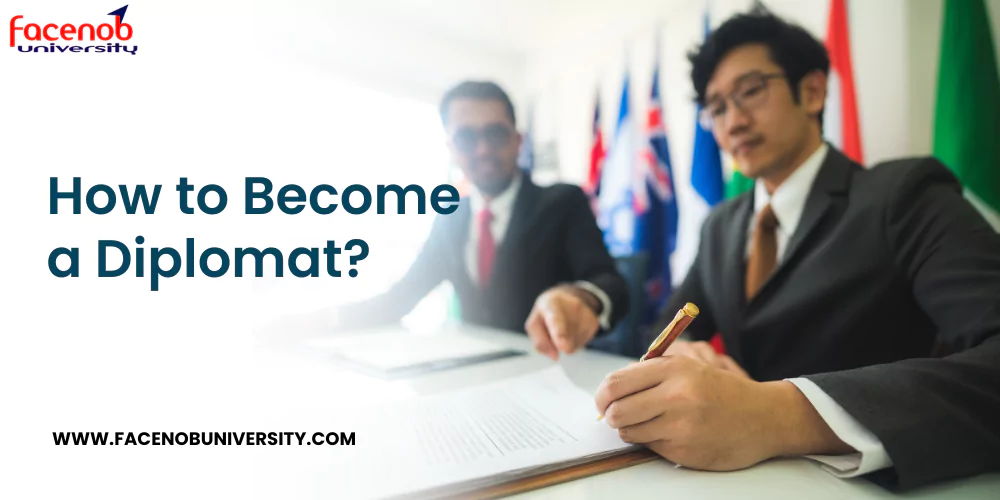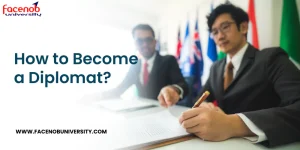How to Become a Diplomat?

Introduction of Diplomat
The art of treating a porcupine without disturbing its quills is known as diplomacy. Diplomats build, maintain, and repair relationships between their country and other countries. They participate in intricate talks and negotiations with international officials to preserve their country’s interests abroad.
Similar Job Titles
- Attache
- Envoy
- Charge d’Affaires
- Emissary
- Plenipotentiary
- Consul
- Foreign Service Officer

Job Responsibilities: Diplomat
What do Diplomats do?
A Diplomat would typically need to:
- Establish and sustain international ties in peace and war, trade and economy, culture, the environment, and human rights.
- Treaties and international accords must be negotiated before lawmakers can officially endorse them.
- Collect and report information that may impact national interests, and advise on how the home country should respond.
- Represent the ideas of the home government to the government of the country where they are placed; persuade the latter to act in ways that the home government prefers.
- Liaise with high commissions and embassies to be an active participant in the shaping of foreign policy.
- Organise and oversee the seamless operation of ministerial and diplomatic trips, from transportation to entertainment.
- Respond to general written correspondence via letter or email while analyzing and interpreting pertinent written material; handle inquiries from other departments and abroad contacts.
- Handle departmental or personal budgets; aid and support colleagues in their policy work.
- While monitoring staff performance and conducting annual appraisals, update and finish personnel records, accounting, and other administrative responsibilities.
- Assess visa applications, conduct interviews, and update travel advice and information; support exporters and persons from the home country; deal with public inquiries face-to-face.
- Depending on where they are assigned, they take on specialized project tasks.
Standard Work Environment
While some diplomats stay in their home countries, most work in foreign embassies and consulates worldwide. In either case, a Diplomat’s job will take them away from the office.
Diplomats may visit the United Nations Offices in Geneva, its headquarters in New York, and the homes or offices of heads of state. A diplomatic dress code would be true blue formal worldwide unless otherwise indicated.
Work Schedule
You will most likely work a typical work week. However, some tasks may require you to be available 24 hours daily. Hours for abroad posts may vary based on where you work as a Diplomat.
Employers
Their country’s country office employs diplomats. You could work in your native country or for government entities representing your country in other countries.
Diplomats are generally employed by:
- Embassies
- Consulates
- High Commissions
Unions / Professional Organizations
Professional associations and organizations are an essential resource for Diplomats who want to further their professional development or network with other professionals in their industry or career. Membership in one or more of these organizations looks excellent on your resume and helps to strengthen your credentials and qualifications.
Workplace Challenges
- Accompanying families or spouses not usually entitled to work
- Assignments to war-torn and hardship countries, with the risk of bombings, shootings, rebel uprisings, and other acts of violence
- Challenging when assigned to unaccompanied posts, where family members are often not permitted to join the appointee
- Need to maintain sound judgment and composure while tackling the stress of working in an environment with a new culture and language, and where specific amenities and comforts of home may be limited
- Close contact with higher rates of disease, severe climates, or social upheaval in assignments to developing countries
Recommended Work Experience
Any experience demonstrating competence in project management, contract management, accounting, economics, and change management is beneficial. A good understanding of current events, both domestic and foreign, is essential in diplomatic circles. Read the newspaper. Attend public lectures by visiting diplomats or government officials and conferences on foreign policy issues.
Prospective Diplomats should assume leadership positions during their graduate and undergraduate studies. Working in student government or a campus political organization is a beautiful way to display initiative and build leadership skills, all desirable qualities in Diplomats.
Volunteering for campaigns or rallies centered on political and government policies and processes is one way to provide time to a political party. Humanitarian work can be beneficial, especially for persons interested in becoming diplomats in a troubled country.
Internships and international experience are critical components of training to be a diplomat. While participanparticipants’ilities differ from bureau to bureau, office to office, and embassy to embassy, it is common for state ministries and international organizations such as the United Nations and Peace Corps to provide internship and volunteer opportunities.
Recommended Qualifications
Although no defined or standardized educational qualifications exist for Diplomats, an undergraduate degree is typically required; most prospective diplomats have a master’s or Ph.D. in political science, public administration, public policy, public affairs, international relations, history, law, journalism, or business administration. Foreign language and speech classes are frequently included in their education.
The primary entry point varies by country, but the typical selection procedure for a prospective Diplomat includes a rigorous series of applications, tests, interviews, leadership and negotiating exercises, oral assessments, evaluations, background checks, and medical and security clearances.
Certifications, Licenses, and Registration
Diplomatic candidates must pass comprehensive background, medical, and security tests.
Projected Career Map
Diplomats typically shift roles every three to four years after a certain period of structured assignments. Your career will include both abroad assignments and work in your home country.
Most foreign occupations entail consular, managerial, and immigration-related duties in missions. However, possibilities to work on information, political, and commercial ventures may also be accessible.
As your career continues, you may specialize in a specific region of the world or type of work, such as bilateral or multilateral work, consular support, project management, or media and communications.
Promotion is based on merit, individual performance, and job availability. Traditional career paths in a country’s Foreign Service include Consular, Political, Economic, Management, and Public Diplomacy. Individuals in any of these paths will possess Diplomatic titles in the countries where they serve and, over the course of a successful career, may rise to the upper rungs of the career ladder, eventually becoming competitive for an ambassadorial slot.
Job Prospects
These are highly competitive positions. Leadership. Education. Global Viewpoint. Humanitarianism. Each of these processes contributes to the formation of a diplomat. Your best ally for the Foreign Service exam is thorough preparation.
Valuable Professional Development
In certain nations, successful applications are included on an official register of successful candidates organized by career path. Prospective Diplomats must complete an intensive orientation program that includes visits to government offices, case studies, practical exercises, and career-specific training. They must perform at least one demanding task.
There is some flexibility in training in other countries. In addition to a foreign deployment, you will spend time in operational and policy responsibilities. You could also devote time to prioritize complex language training.
All Diplomats are encouraged to continue their professional growth, including training in information technology and foreign languages, throughout their careers. Take advantage of the learning possibilities provided by your government. Learning on the job is a crucial aspect of understanding how the Diplomatic Service works.
Working in your own nation and abroad requires the capacity to absorb new information and deal with various scenarios. Establish a focus and bid on as many tasks as possible. Learn about the region’s history, geography, culture, language, political structures, and global economy.
Moving every few years is a part of life in the Foreign Service. Accept all positions that are offered to you, even if they are not in your core field of study or are in remote or unstable areas. You demonstrate loyalty to the Diplomatic career by remaining flexible and going where you are called.
Conclusion of Diplomat
We construct far too many walls and far too few bridges. Diplomacy may be the appropriate choice if you want a tough and lucrative job that takes you worldwide.
Advice from the Wise
Begin at the bottom and work your way up. Make an impression. Do a good job Network. Make some relationships.
Explore Also: How to Become a Congressional Aide?

You actually make it appear so easy along with
your presentation but I in finding this matter to
be actually something that I believe I would
by no means understand. It seems too complicated and very broad
for me. I’m looking forward on your next publish, I will
try to get the grasp of it! Escape room
Very interesting details you have noted, appreciate it for posting..